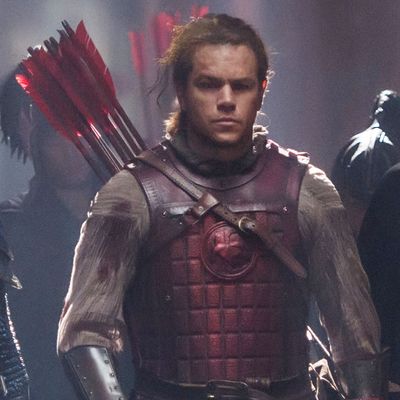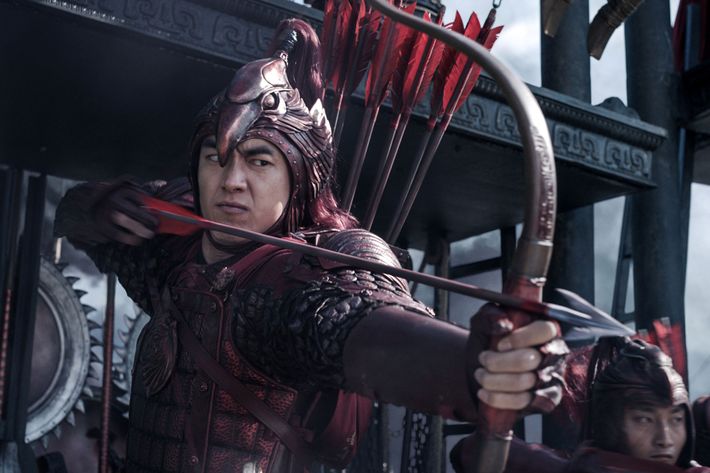
The Great Wall, which stars Matt Damon as a monster-slayer in medieval China, hits U.S. theaters this weekend, finally answering the question: How many white men does it take to save the Great Wall of China? In the run-up to the movie’s release, Fresh Off the Boat’s Constance Wu echoed the concerns of many Asian-Americans when she criticized the movie for peddling the “racist myth” that people of color need to be saved by white people. The movie hasn’t been able to shed this controversy, with Damon himself telling people to see the movie before they criticize it. Of course, that’s a tactic that makes the movie money either way, something you may not be into. That’s where Vulture comes in. We watched The Great Wall, and are happy to help you calibrate the appropriate amount of outrage for it.
So, what’s the movie about exactly?
Matt Damon plays William, a European mercenary in Song Dynasty China on the hunt for “black powder” (gunpowder) alongside his pal Pedro Pascal. In their quest, they happen upon the Great Wall, manned by an army called the Nameless Order, who defend the wall from a horde of monsters called the Tao Tei. While Damon’s character is initially motivated by individualism and greed, the beautiful Commander Lin Mae (Tian Jing) teaches him that there are greater causes to fight for, like saving China. Damon is swayed by her message and desire to do trust falls, and helps lead the charge to defeat the monsters.
How does he do that?
In one of the movie’s many incomprehensible action scenes, Damon and Pascal are attacked in the dark of night by one of the monsters, and Damon manages to chop off one of its claws. When the Nameless Order captures them, they see the Tao Tei hand and are amazed: How did this gweilo manage to kill a Tao Tei when we’ve been fighting them our entire lives? A few scenes later, when the Wall is attacked by an army of Tao Tei, Damon and Pascal kill a couple of those suckers and are immediately hailed as heroes. White exceptionalism is a helluva drug.
So it sounds like Constance Wu was right?
Yes. The Great Wall has a white-savior complex, an issue that’s different from “whitewashing,” (which would mean that Damon was playing a character originally written as a person of color, a straw-man argument the actor’s been using on the press tour). While the Chinese clearly demonstrate impressive technological might, the narrative revolves around Damon’s character: His actions, bravery, and ingenuity are what propel the plot forward. Most troubling is the fact that the Chinese, both visually and narratively, are often represented as their own kind of indistinguishable horde — shields to be raised, bodies to be killed, etc.
But didn’t Zhang Yimou say that there are four Chinese heroes?
There are some Chinese characters, but the only one of any significance is Lin Mae, who gets a big heroic moment in the end, but mostly serves to move William’s heart. While the movie was directed by Zhang Yimou, it’s important to note that the script was written by Carlo Bernard, Doug Miro, and Tony Gilroy, from a story by Max Brooks, Edward Zwick, and Marshall Herskovitz. (Do you sense a pattern?) The movie is mostly in English; it’s got fewer subtitles than an episode of Lost.
So are William and Commander Lin Mae, like, you know …?
Lin Mae is one of the only commanders who can speak English, so she becomes the de facto interpreter for William, and his interest is clearly piqued from the moment he sees her in her souped-up Chun-Li power armor. All of their scenes together make you feel like they are thisclose from making out.
So do they make out?
No. Rest easy, bruh.
Are there any hotties to thirst after?

Here’s Lin Gengxin, who only appears in a few scenes and has no plotline of his own. #Linsanity
Alright, let’s table the whole white-savior thing for a second. I mean, I still watched The Last Samurai. Is the movie any good?
It’s emphatically mediocre, which makes it hard to get worked up about. The monsters are generic, the action scenes are often incomprehensible, and huge sections of plot seem to have been edited out. Still, there are moments where it achieves the sublime ridiculousness of a Fast and the Furious or Mortal Kombat movie. The best parts of the movie come when it leans into epic-fantasy mode: The Nameless Order wears crazy color-coded armor, almost like they’re Power Rangers. The women, dressed in blue, are called the “Crane Corps” and they have a fun technique where they bungee jump off little diving boards to spear the monsters.
That sounds pretty dope!
It is! Plus, the Chinese army has some cool weapons, like these giant scissors that appear from slits in the Wall and cut the monsters in half while they’re scaling the wall. If nothing else, the movie should be commended for inventing the concept of wall-scissors.
Should I be mad about this movie?
Meh. Call your senators, instead.

